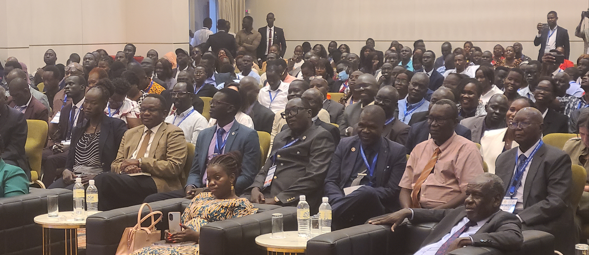The East African Health and Scientific Conference (EAHSC) concluded last Friday in Juba with nine key resolutions focused on strengthening health care systems across the region to ensure effective responses to ongoing and emerging health threats.
A major highlight of the resolutions is the call to strengthen referral hospitals, with a particular emphasis on Juba Teaching Hospital, which was identified as one of the most vulnerable within the East African Community (EAC) member states.
Reading out the outcomes of the three-day conference, Dr. Steve Wandigo, co-rapporteur of the event, explained that all member states have been asked to allocate financial resources to improve national and regional referral hospitals to increase access to surgical care.
“There is a need to commit to equipping and upgrading national and regional referral hospitals. A case in point is Juba Teaching Hospital, and the idea that was noted was when we do this, there is going to be access to surgical care, but at the same time, we need to ensure that there is financing that also integrates lower-level facilities,” he said. “We also agreed that there is a need to establish cancer screening programs, diagnostics, and improved registries.”
In addition to infrastructure, the conference emphasized the need to enhance disease prevention programs, particularly those targeting cervical cancer, HIV, and other communicable diseases.
Other resolutions included scaling up the health workforce by offering grants and incentives to medical students, implementing structured internship programs, and formalizing community-level care systems. The conference also called for building local capacity, harmonizing regional health policies, validating web-based portals, and increasing digital health awareness.
“Our resolution number five was reforming health financing, strengthening financing by taxing harmful products, allocating a minimum of 5 percent of GDP to health, and designing progressive social protection systems,” Dr. Wandigo added. “Resolution six emphasizes integrating maternal health and specialized care, prioritizing screening, treatment for depression in HIV clinics, integrating mental health into public health care systems, and developing dedicated cancer units.”
“It is now incumbent upon all stakeholders, East African Community partner states, East African secretariat, development partners, researchers, practitioners, and communities to translate these resolutions into tangible actions,” he added.
The conference, held under the theme “Addressing Health Priorities and Advancing the East African Health Agenda,” served as a regional platform for scientists, researchers, policymakers, and development partners to tackle pressing health challenges.
For her part, Prof. Rose Aja Costa, a South Sudanese participant and member of the Board of Commissioners in the East African Scientific Research Commission, expressed pride in South Sudan’s ability to successfully host the event:
“I am so proud because there were some doubting Thomases who said South Sudan cannot host this (event). Today, I am so proud that we hosted a very successful event, and we are handing it to the next country,” she said. “As the vice president said, if the next country is not ready to host, South Sudan will be more than ready to host the coming conference.”
Costa highlighted the relevance and significance of the topics covered and said several academicians discussed papers and challenged each other.
“Hopefully, the insights that came out from this conference will be taken forward and be shared with the health services in this country, and our country will never be the same again, as said by our hero, Dr. John Garang,” she said.
Meanwhile, Amanya Jacob, Director of Research at the South Sudan Ministry of Health, said he had challenges preparing for the conference.
“It has not been easy because when we were given the torch, we were first asked to submit more than 50 percent of the abstract with the region, and if we submitted less as a country, we would not be able to host the conference,” he said. “So, my experience in the last three days has been very difficult as a person because I could not rest as I had more than eight abstracts to present.”
Beatrice Askul Moi, Chairperson of the EAC Council of Ministers, used the occasion to challenge perceptions of insecurity in Juba.
“I want to tell you, as the Chair of the Council of Ministers, that it was not just a visit. Although I am a social scientist by profession, I learnt a lot in the three days,” she stated. “I want to appreciate the fact that we are here, despite what was said earlier, that Juba is a bit not okay for partners to visit. I can assure you the reason why I came here for the three days was to disprove the fact that we were told that Juba is not there.”
According to Moi, the EAC often receives advisory notes suggesting that Juba is unsafe—a narrative she firmly rejected.
“I know we normally get advisory notes, but I can assure you, whoever was putting that information forward to the member states that it is not well in Juba must be disproved, and I want the media to cover this properly, that Juba is safe,” she said. “We should encourage each other in interaction, in visiting, and even knowing the community.”




